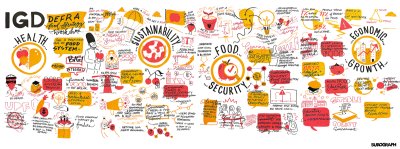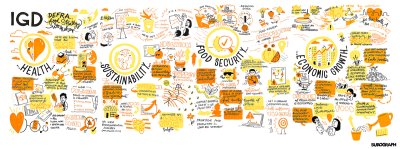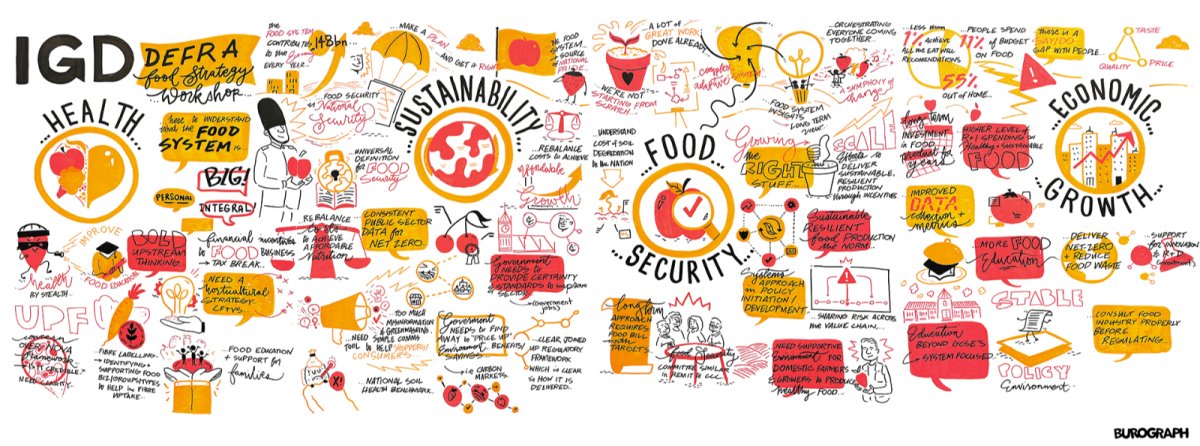
We are now over six months into the new Food Strategy process initiated by the Department for Environment, Farming and Rural Affairs (Defra) Secretary of State Steve Reed MP. With a vision of ‘a food system that grows the economy, feeds the nation, nourishes individuals, and protects the planet, now and in the future’, the Food Strategy aims to:
- provide more easily accessible and affordable, safe, nutritious, healthy food to tackle diet-related ill health; helping to give children the best start in life and help adults live longer healthier lives;
- drive investment, productivity and innovation so that our largest manufacturing sector can realise its potential for economic growth
- reduce the impact of farming and food production on nature, biodiversity and climate
- maintain our food security by building resilience in the face of climate shocks and geopolitical changes
Achieving all this requires some serious joined up thinking in government and the involvement of Parliament. There is already a plethora of ideas on solutions and evidence of what works out there, much coming from Sustain and its alliance members, as well as the previous work of Henry Dimbleby and his team. Who is the Government really going to listen to, and what areas will it prioritise as it sets out a Food Strategy that can truly meet the challenges of today and the next generation?
Government leads: a promising cross-departmental approach but some controversial advisors
Since the process started, progress has included the establishment of the cross-departmental Ministerial Food Strategy Group. With its intended ’joined-up approach to food across government’, Sustain has welcomed this long-overdue move forward for coherence. Chaired by the Defra Secretary of State, it has met once and is due to meet again very soon with ministers attending from the Department of Business and Trade; Department for Education; Department of Health and Social Care; and the Ministry of Housing, Communities and Local Government. As might be expected, not much is known about ministerial dialogue in this space, but it undoubtedly needs to be a mechanism that works as, without an effective cross-government Food Strategy, this Government will not fulfil its Plan for Change and missions.
With the Food Strategy considering the food system of the UK as a whole, and large elements of food policy being devolved, Defra says it will work closely with the Devolved Governments as the strategy is developed.
Rachel Fisher, Deputy Director, Food Security and Strategy, has become the lead official at Defra on the process to develop the Food Strategy, coming into the role in February (having been Deputy Director, Land Use Policy). Rachel has been actively meeting with organisations. Sustain has been pleased to meet up with her in our own right, with other food policy charities, and with our partners in Sustainable Food Places. Rachel has offered to come to the spaces Sustain convenes, and these opportunities for dialogue with members will be set up soon.
More controversially, Defra has set up a Food Strategy Advisory Board with a makeup of mainstream retailers, foodservice companies, intensive meat producers and processed food manufacturers that has raised widespread concern.
Included in the board is the Chair of Cranswick plc, a major industrial meat producer whose operations have raised concern about environmental pollution, climate change and animal welfare. It is the same company behind the megafarm planning application in Norfolk which was blocked by the council, with the help of Sustain, on climate grounds. Ministers have defended the Advisory Board, saying: ‘Members are senior leaders who represent important elements within the food system and the diversity of the sector, appointed for their individual experience and standing.’ When asked in Parliament whether the Defra Secretary of State plans to review the membership of the Chair of Cranswick plc on the Advisory Board, the answer was: ‘Defra has no current plans to review membership of the Food Strategy Advisory Board.’ and that ‘members do not represent their business interests’.
Sustain expects government to manage any conflicts of interest that may arise, and with others, has called for the transparency, accountability and open working that are key to maintaining trust and good outcomes: this requires, at minimum, the publication of the terms of reference for the Advisory Board, disclosure of topics that will be discussed at its upcoming meetings, and publication of summaries of what has been discussed in the meetings. None of this has yet happened.
Multistakeholder workshops: industry heavy and low on public health representation
Recently Defra, ‘in collaboration’ with the IGD (Institute of Grocery Distribution), held four multistakeholder workshops, in London, Birmingham and Leeds as the start of its ‘first phase’ of food strategy stakeholder engagement.
The workshops explored the four areas of the Food Strategy looking at intended outcomes, ‘jobs to be done’, as well as potential synergies and trade-offs. Whilst positive in that they signalled some useful dialogue had begun, there was also frustration from civil society at the topline level of discussion, and despite assurances to the contrary, the ‘blank sheet of paper’ feel to the exchanges.
Participants at the workshops learnt that, in addition to the four aims or ‘pillars’, as Defra is calling them, the Food Strategy action plan has the following ‘cross-cutting themes’:
- celebrating UK food and food culture;
- fairness through the supply chain;
- building trust and empowering consumers through data and transparency;
- local and place-based initiatives.
Sustain very much welcomes that the Government is to explore the role of local action and place-based initiatives as the Food Strategy is developed.
The workshop Sustain attended (in Leeds) was food industry heavy. As others had reported from workshops elsewhere, public health representation was notably thin on the ground, and food poverty and social justice organisations were virtually absent. It appears some crucial public interest parts of the food system are not yet fully part of the ‘partnership’ to develop the Food Strategy, Defra rightly sees as needed for a ‘strategic approach’ that ‘considers the UK food system as a whole’.
The workshops also included presentations from academics (Defra has an ongoing engagement track with academics).
A series of visuals below (plus main image) from the workshops by Burograph were released by Defra:


Daniel Zeicher has said: “There is huge expertise, energy and commitment to work towards better food system outcomes, and all stakeholders need to be part of the solution. There will be multiple routes to share ideas as part of the co-design process in 2025. This collaboration aims to shape the strategy's scope and work together to deliver a comprehensive strategy.”
Kath Dalmeny, Chief Executive of the Sustain food and farming alliance, said:
“The government’s Food Strategy work is off to a promising start. We have strong concerns about whether large corporate interests will hold sway, especially those representing unhealthy processed foods, and intensive meat production industries. The clear imperative must be to improve the health of the nation, especially children, and to reduce the gigantic environmental impact of food production, distribution and waste. We are also very concerned to ensure that the benefits of a healthy sustainable system are enjoyed more equitably by people living on a lower income, this has barely been discussed and must be a priority.”
In addition to establishing cross government and external stakeholder engagement mechanisms, cross government work is taking place on ‘the vision, outcomes and action plan’.
‘Just the beginning’: more dialogue across the food system to come
Defra has said that the multi-stakeholder workshops are ‘just the beginning’ and that they are now ‘holding discussions with a broad range of food system sectors, in smaller, more focused groups based around existing Defra sector forums. These include multiple agricultural sectors, with further plans to engage with representatives from manufacturing, retail, hospitality and SMEs. This is in addition to extensive dialogue across the food system. These are providing more specific insights into sector aspirations, concerns and opportunities that may arise from change to the food system.’
Alongside the sector specific discussions, Defra are organising meetings with representatives from key environmental NGOs and civil society groups “to ensure we are considering the perspectives of all groups within the food system”.
Defra is also working with the Food Foundation and the Food, Farming and Countryside Commission on a programme of citizen engagement over the next few months. This builds on their respective Citizens Assemblies and Ambassador programme.
‘A programme rather than a one-off event’: plans to deliver at pace but overall timeline not yet known
Defra say the Food Strategy ‘will not be a single-moment-in-time document but rather a programme for change that links together actions across government and the food industry to common goals and ambitions’.
There appears to be no definitive overall timeline. In the short term, at the EFRA Committee evidence session with Steve Reed on 20 May, Emily Miles, Defra DG for Food, Biosecurity and Trade, said: “We are aiming to do an update before the summer. It will be a framework, but there will also be a series of policy announcements that need to flow from it, so I would not see it [the Food Strategy] as a one-off event.”
There is some uncertainty as to how substantive any ‘update’, ‘framework’ or ‘action plan’ will be published ahead of Parliament heading on summer recess. Defra promises more about how the Food Strategy ‘will move from concept to reality and how this will be done in partnership with everyone who has a stake in it’.
Minister for Food Security and Rural Affairs Daniel Zeichner has said that the Government will consider whether formal consultation is appropriate at relevant points in the process, that it wants to achieve results “at pace”, and that, as Defra Secretary Steve Reed has also underlined, they are open to new law and regulation if needed.
Glen Tarman, Director of Policy and Advocacy for Sustain, said:
“Sustain wants a national, regional and local, cross-thematic Food Strategy that would meet the Government's stated aims and make the UK food system fit for all. That will mean adopting a range of policy calls from public interest organisations, networks and alliances. It will mean not asking whether or not we need legislation, but moving to what new law and regulation the country needs. It will also mean moving forward soon with policy proposals and going beyond engagement to a sequence of formal consultations. And it requires a process that is ever more participatory, inclusive, transparent and meaningful , one that responds to the voices of those directly affected by the injustices, inequity and unfairness of the present food system, and the expertise of civil society.”
Sustain will continue to put forward alliance positions and support its members in their work and engagement with government on the Food Strategy.
Sustain: Sustain The alliance for better food and farming advocates food and agriculture policies and practices that enhance the health and welfare of people and animals, improve the working and living environment, enrich society and culture and promote equity.








